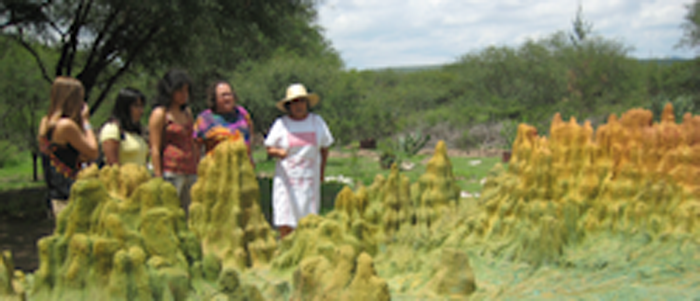
The Center for Global Justice takes small groups to visit some of the local communities that we have worked with. These give you a view of another Mexico, its problems and the creative solutions ordinary people are developing. Some of the communities we have visited include:
Grupo de Acción Interdisciplinaria Ambiental (GAIA) was founded by the Caldera family. The four member family lives outside of San Miguel on the way to Jalpa, in a community called Sosnabar. GAIA’s mission is to bring sustainable and renewable energy technologies to rural Mexico that will be appropriate and usable for rural people. They have built three houses as part of their “eco-village” that use techniques such as solar stoves, dry toilets, wind power, solar water heaters, and many more. Their goal is to host groups long-term and provide workshops and training sessions to those visitors.
El Pipila de Peñon de los Baños is one of the only groups of campesinos producing organic vegetables in the area around San Miguel. Through the Global Justice Center's Revolving Loan Fund Project, the coop received a low-interest loan to build their first organic greenhouse. Since then, the cooperative has received funds from the state government to build eight more greenhouses.
Cieneguilla is located in the Sierra Gorda Mountains in the Terria Blanca municipality an hour and half outside of San Miguel de Allende. The Cieneguilla congregation is made up of 19 communities and was founded in 1536. This community is a place where ancient indigenous culture and modern traditions live side by side. The marketing cooperative of Mujeres Productoras was formed by 15 women of the community. This community, due to it’s rich indigenous history is imbued with culture and ritual and the Center often takes groups to Cieneguilla to participate in one of their most ancient of traditions, “the temascal” or sweat lodge.
El Centro de Desarrollo Agropecuario (CEDESA) was founded in 1965 by a catholic priest and several nuns concerned about they saw as the many necessities and injustices visited on the people of northern Guanajuato state. The organization began teaching literacy and other skills to rural campesinos. CEDESA’s mission has evolved to include contributing to the organization, abilities and health of these communities. Their goal is for campesinos to strengthen their identities and productive abilities, their knowledge of ecology, and the ability to make autonomous decisions as communities. Their projects include many sustainable agricultural technologies of which they provide training to local people. They are also avid activists for local conservation projects and work with many organizations, such as the Center for Global Justice on joint projects involving communities and education. CEDESA also produces its own brand of food stuffs and traditional medicines.
